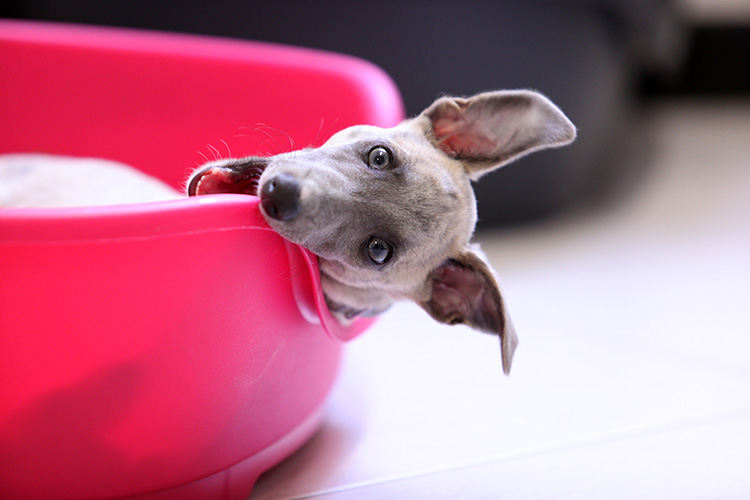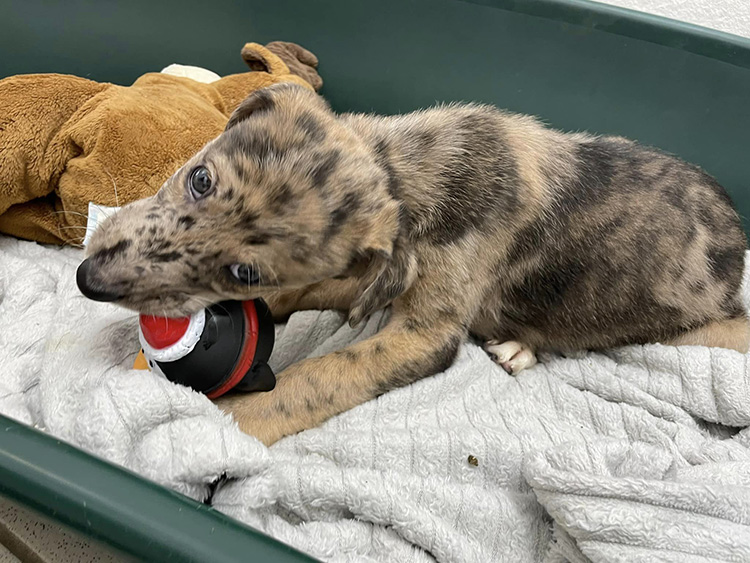New cat
How to set up your home to help your new cat settle in quickly
Cats, Adopters, Cat behaviour, Kitten

Puppies investigate the world around them with their mouths and teeth, and it is very comforting action for them, so it is important they are given many things they are allowed to chew.
Puppy-proof your house to ensure no items you don’t wish puppy to chew are left lying around. Puppies need to be supervised at all times, if left unattended they will find things to amuse themselves with!
Puppies should always have plenty of suitable chew items available to help keep them occupied; ideal things are Kong toys, Nylabones and rope toys. If they start to chew something else, don’t make a big fuss or tell your puppy off, but instead exchange it for one of their toys or chews, and praise them when they are chewing that.
» Read our article: Puppy playtime and training: Enrichment
Between the ages of 14 and 28 weeks, puppy teeth fall out and adult teeth are coming through so they will chew to relieve their sore gums. Frozen carrots, raggy toys soaked in water and then frozen, and stuffed Kongs can all help provide much needed pain relief and keep your puppy occupied. If your puppy seems in pain, it is always best to see your vet.

Mouthing is when a dog holds or chews you with their mouth, usually your hands or ankles. It isn’t a snap or bite. Puppies learn all about mouthing from their litter mates while playing. When one puppy is mouthed a little too hard, he will let out a yelp and the game will stop. This tells the other puppy they have mouthed too hard. Your puppy may then continue to mouth but a little lighter and so on until they learn how hard is acceptable. Once at home your puppy will also try this game with you. Although it might be endearing to start with, it will not be so much fun when they are fully grown.
It is very important that you never tell your puppy or adult dog off for mouthing, it is a natural behaviour, puppies explore the world with their mouths in the same way that children explore the world with their hands; puppies may mouth when teething because they are actually in pain and are attempting to relieve this pain by chewing on something.
We teach them what we want the to do instead, rather than just what we don’t want. It is vital that we only use positive ethical methods; any negative training will have an impact on your relationship with your dog and in some cases can turn mouthing into aggression.
If puppy continues to mouth, say ‘ouch’ in a normal voice (it is not meant to be a reprimand or to scare your puppy), stop interacting with your puppy and turn or walk away, out of the room if necessary. This teaches your puppy that mouthing is a pointless activity as it results in a boring outcome; over time this will make mouthing a non-rewarding behaviour to do.
Adult dogs can mouth because they didn’t get that experience as puppies and therefore still see mouthing as play. Sometimes adult dogs mouth when they are over excited or stressed – chewing or holding onto an object is stress-relieving for a dog and if we don’t teach them to channel this into appropriate items such as toys, dogs will chew/mouth whatever is available.